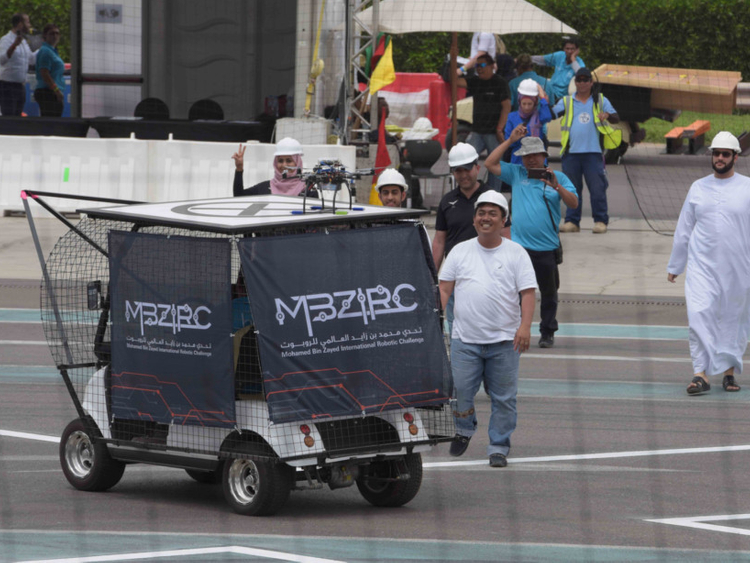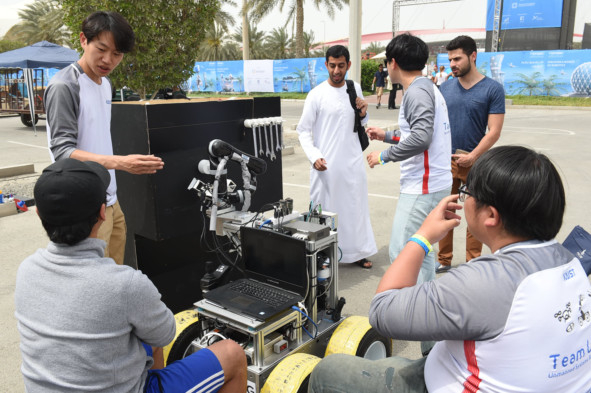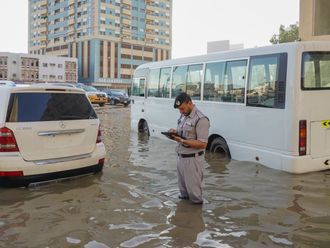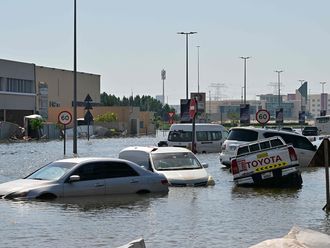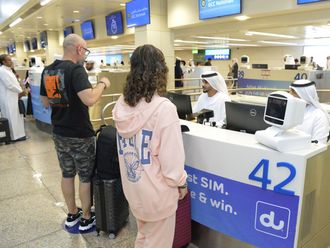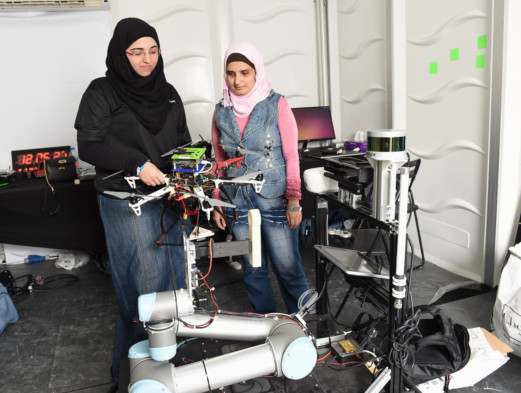
Abu Dhabi: Teams from around the world converged in Abu Dhabi on Thursday with their built robots to take part in the first-ever Mohammad Bin Zayed International Robotics Challenge (MBZIRC).
Launched under the patronage of His Highness Shaikh Mohammad Bin Zayed Al Nahyan, Crown Prince of Abu Dhabi and Deputy Supreme Commander of the UAE Armed Forces, and organised by Khalifa University, the MBZIRC is the UAE’s biggest robotics competition with a total grand prize of $5 million.
As part of the competition, the teams are given a series of challenges their robots must successfully complete. The challenges include using an unmanned aerial vehicle (UAV) to locate, track and land on a moving vehicle. Another task involves using an unmanned ground vehicle to locate and reach a panel and to then afterwards successfully operate a valve stem on the panel.
“The MBZIRC epitomises our country’s passion for excellence in technology and innovation as called for by our local and national development agendas,” Hussain Ebrahim Al Hammadi, UAE Minister of Education, commented about the inaugural competition.
“This pioneering competition provides a blueprint for us to encourage more students to actively engage in robotics and technology and turn the UAE into a leading source of knowledge and expertise in these fields. It will also reveal the vital role of robotics in providing solutions to today’s major challenges,” he added.
Dr Arif Al Hammadi, executive vice-president at Khalifa University, said the competition and its participating teams would help with innovative solutions for the future.
“This competition encourages all the best brains in the world to come to the UAE to compete in making robots do things people can’t do. This year the competition is about search and rescue, [and] disaster recovery.
“Twenty-six teams from 15 countries are coming to compete to solve problems that are very complex … That is the spirit of the competition for this year. Every two years, we are going to find a new challenge and, every two years, we are going to do something that is going to [be] beneficial [for] humanity and the world,” he added.
Al Hammadi said that the successful teams in the competition would also have a bright future ahead of them, with several industries keen on hiring the best talent in the field of robotics.
“A lot of talent is going to be recruited from this competition, [for] the team that is going to win, I can guarantee them jobs immediately anywhere in the world because the industry is going to be running after them.”
He also commented positively on local Emirati talent competing with international teams from around the world.
“Our teams have to compete at an international level, to be the best in the world you cannot say I am going to compete with my own self; you have to compete at an international level [to become the best].”
The teams
Khalifa University — Mohammad Bin Rashid Space Centre
Randa Al Madhoun, research assistant
“Our team is participating in three challenges. For the first challenge, we developed a UAV that includes a camera and an on-board computer system so that it can track the moving truck and track the marker above it and then try to land on it autonomously.
“In challenge two, we developed and used a ground vehicle system which also has a camera and a mounted manipulator so that it can go and locate the panel. For challenge two, the time was so strict so the team could not finish it before the [given] time.
“After this competition, we will have a lot of developed systems that can be used for further research. We now have five drones ready to be used by students and researchers. We [also] have a ground vehicle that is ready to be tested and used for other research. We have benefited from the skills [we learnt in the competition], working as a team, and time management.”
King Abdullah University of Science and Technology
Jeff Samma, professor and team leader
“This is our first competition, the spirit of the challenge was very much in line with the spirit of what we wanted to do as a laboratory, part of it being autonomous robotics, getting robots to do things on their own ... And getting robots to do things together.
“We are involved in challenges one and two, despite our best intentions to be involved in challenge three, hardware sometimes has moods and doesn’t cooperate with you. Today we were out with our ground robot and we had partial success in finding the panel but we didn’t close the deal … The robot decided to go on pause, that’s part of the challenge, to deal with temperamental machinery.”
University of Tokyo
Wesley Chan, team co-leader
“It’s a very interesting and exciting experience for us, there is definitely attached challenges to having a flying vehicle. We have competed in tasks one and three. Everybody has been trying very hard with the challenges, things can go a bit unexpected. We were able to learn some things and hopefully be able to improve [as the competition progresses].
“Some of the challenges are inspired by real-life incidents, and the organisers put forward these challenges and so people like academia can go and participate in the challenge [and find solutions].
“I think collaboration between academia and industry is very good and can steer academic research towards the direction of where we can use our research.”


